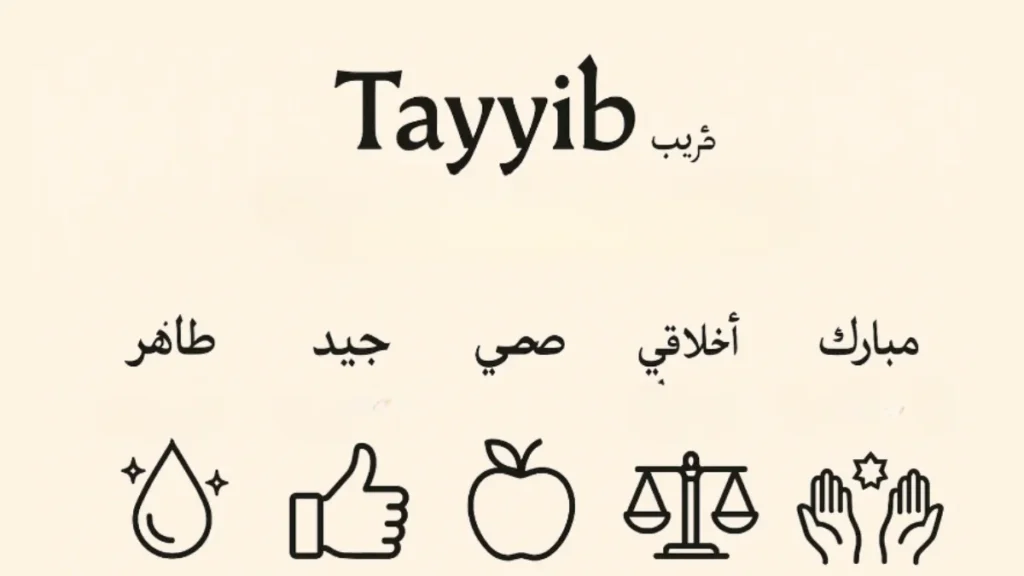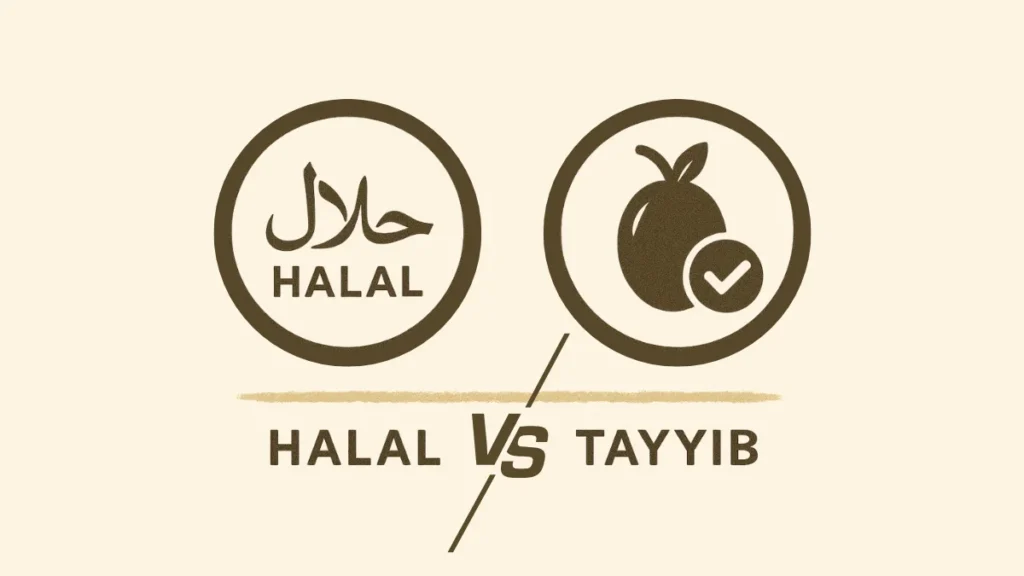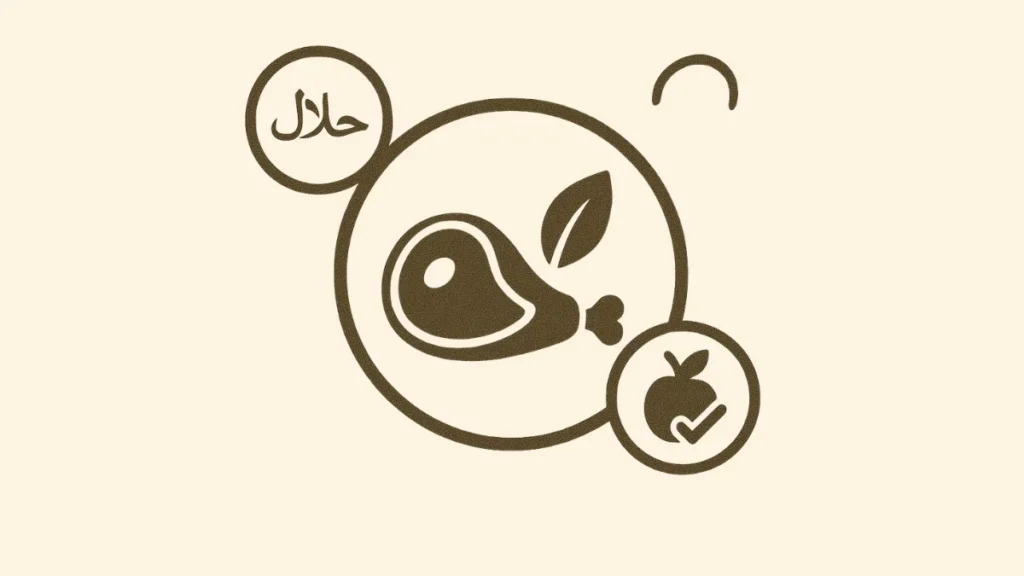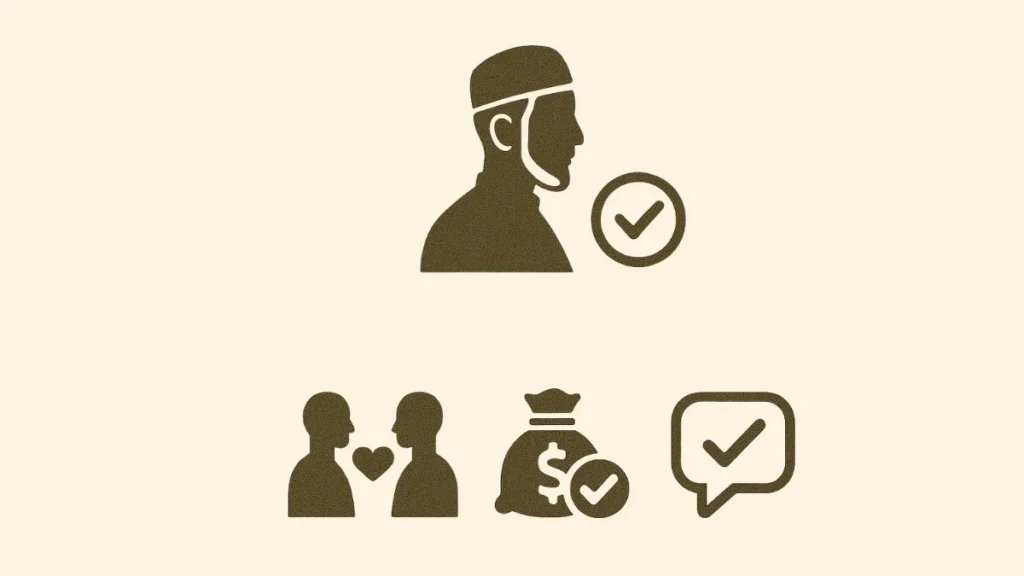As Muslims, we live each day seeking the pleasure of Allah (سبحانه وتعالى) through our actions, words, and decisions. Among the most important but least known concepts of Islam is Tayyib (طيب), an Arabic word that goes far beyond what most of us imagine.
The term Tayyib appears repeatedly in the Quran and hadith, guiding us toward a purer, more conscious, and blessed life. While many brothers and sisters are familiar with the concept of halal (permissible), Tayyib invites us to raise our standards and seek not only what is allowed, but what is truly good, pure, and beneficial.
In this article, we will explore together what Tayyib really means, how to differentiate it from halal, and why implementing this concept in our daily lives can transform our relationship with Allah, with ourselves, and with our community.
What does Tayyib mean in Islam?

Definition and etymology of Tayyib
The word Tayyib (طيب) comes from the Arabic root ط-ي-ب (ṭ-y-b), which directly relates to concepts of purity, goodness, and excellence. In its deepest meaning, Tayyib refers to everything that is:
- Pure (طاهر): Free from physical and spiritual impurities
- Good (جيد): Of excellent and beneficial quality
- Healthy (صحي): That brings wellness to body and soul
- Ethical (أخلاقي): Obtained and produced in a just manner
- Blessed (مبارك): That contains Allah’s barakah
When we speak of Tayyib food, for example, we don’t refer only to halal food, but to foods that are also nutritious, were produced ethically, and whose consumption brings us closer to Allah rather than distancing us from Him.
The beauty of the Tayyib concept lies in that it encompasses our entire existence: from what we eat to how we earn our livelihood, from the words we speak to the relationships we cultivate.
Tayyib in the Quran and Sunnah
Allah (سبحانه وتعالى) mentions Tayyib in numerous Quranic verses, establishing its fundamental importance in the Muslim’s life:
يَـٰٓأَيُّهَا ٱلنَّاسُ كُلُوا۟ مِمَّا فِى ٱلْأَرْضِ حَلَـٰلًۭا طَيِّبًۭا وَلَا تَتَّبِعُوا۟ خُطُوَٰتِ ٱلشَّيْطَـٰنِ ۚ إِنَّهُۥ لَكُمْ عَدُوٌّۭ مُّبِينٌ
“O people! Eat of what is lawful and good (halal tayyib) on earth….”
📖 (Al-Baqarah 2:168)
In this verse, Allah doesn’t only mention “halal” but specifically adds “tayyib“, indicating that both concepts should go together. It’s not enough for something to be simply permitted; it must also be pure and beneficial.
Prophet Muhammad (صلى الله عليه وسلم) also emphasized the importance of Tayyib in several hadith. In one particularly significant narration, the Messenger of Allah said:
“Allah is Tayyib (pure) and only accepts what is Tayyib”
This hadith teaches us that the purity of Tayyib is not just a recommendation, but a requirement for our actions and offerings to be accepted by Allah. When we make du’a, when we give zakat, when we perform any act of worship, it must be accompanied by Tayyib sustenance and life.
Difference between Halal and Tayyib: Beyond the Permissible

Why isn’t Halal enough?
Many brothers wonder: “If something is halal, isn’t that enough?” The answer comes from the Quran itself when Allah mentions both terms together. Halal establishes the minimum permitted, while Tayyib leads us toward excellence (ihsan).
Halal answers the question: “Can I do this?” Tayyib answers the question: “Should I do this?”
A clear example: A halal meat burger from a fast-food chain is technically halal, but may not be Tayyib if:
- It contains harmful chemical preservatives
- The meat comes from mistreated animals
- Its excessive consumption damages our health
- It was bought with money from questionable sources
Characteristics of Tayyib food
For food to be truly Tayyib, it must meet several criteria that go beyond simple religious permissibility:
Physical purity: Tayyib food must be free from harmful substances, unnecessary chemical preservatives, and contaminants that could damage our body, which is an amanah (trust) from Allah.
Nutritional value: Tayyib food must truly nourish our body, providing the necessary elements to keep us strong and healthy to fulfill our obligations toward Allah and our family.
Ethical origin: Tayyib products must come from just sources. This includes humane treatment of animals, fair wages for workers, and agricultural practices that don’t harm the environment Allah entrusted to us.
Lawful sustenance: The money used to buy Tayyib food must come from halal sources. As the hadith says, the body that feeds on haram will not enter Paradise.
Practical examples: Halal vs Tayyib
To better understand the difference, let’s look at some examples from our daily lives:
Example 1: Meat
- Only Halal: Meat slaughtered according to Shariah but from animals raised in deplorable conditions, fed hormones
- Halal and Tayyib: Meat from free-range animals, naturally fed, slaughtered with compassion and respect
Example 2: Livelihood
- Only Halal: Work in a company that doesn’t sell haram, but exploits its employees or pollutes the environment
- Halal and Tayyib: Honest work that benefits society, with fair conditions and respect for creation
Example 3: Relationships
- Only Halal: Islamic marriage that meets legal requirements but lacks love, respect, and mutual spiritual growth
- Halal and Tayyib: Marriage based on piety, love, mutual respect, and joint growth toward Allah
The Importance of Tayyib in Muslim Nutrition

Tayyib foods: Pure, nutritious and ethical
In our time, where processed foods and fast food dominate our tables, returning to the concept of Tayyib food becomes more urgent than ever. Islamic scholars always understood that what we eat affects not only our body, but also our heart and spirituality.
Tayyib foods are characterized by:
Simplicity and naturalness: Foods closest to how Allah created them tend to be more Tayyib. Fresh fruits, organic vegetables, whole grains, and meat from naturally raised animals maintain their original purity.
Moderation in processing: While some processing is necessary and permissible, Tayyib food avoids over-manipulation that destroys nutrients and adds unnecessary chemicals.
Known origin: As much as possible, Tayyib products come from reliable sources where we know the production conditions and can ensure ethical principles were respected.
How to identify Tayyib food
Identifying Tayyib food in our modern world requires a bit more effort, but Allah rewards our good intentions:
Read labels: Tayyib foods have short and understandable ingredient lists. If you can’t pronounce an ingredient or don’t know what it is, it’s probably not Tayyib.
Know your source: Whenever possible, buy from local Muslim producers or companies that share Islamic values of justice and responsibility.
Observe how you feel: Tayyib foods give you clean energy and make you feel good physically and spiritually. If after eating you feel heavy, lethargic, or spiritually restless, reflect on the Tayyib quality of your food.
Consider the price: While not always the case, genuine Tayyib foods often cost a bit more due to their ethical production. Remember that investing in Tayyib food is investing in our health and relationship with Allah.
The spiritual impact of consuming Tayyib
Islamic scholars always taught that there’s a deep connection between what we eat and our spiritual state. Tayyib food not only nourishes our body, but purifies our heart and facilitates our connection with Allah.
When we consume Tayyib food:
- Our du’as are more likely to be accepted
- Our dhikr becomes more present and sincere
- Our energy for acts of worship increases
- Our character becomes more noble and patient
Conversely, food that is not Tayyib, although halal, can create spiritual barriers that hinder our growth as Muslims.
Tayyib in Daily Life: Beyond Food

Tayyib in interpersonal relationships
The Tayyib concept extends to all our human interactions. Tayyib relationships are those that:
Bring us closer to Allah: Tayyib friendships and relationships motivate us to be better Muslims, remind us of our religious obligations, and support us in our spiritual growth.
Are based on sincerity: Tayyib relationships are free from hypocrisy, envy, and malice. They are transparent, honest, and seek mutual good.
Promote Islamic values: In Tayyib relationships, piety, generosity, justice, and compassion are fostered, following the example of the Prophet (صلى الله عليه وسلم).
Tayyib income and wealth
Tayyib sustenance is fundamental for our entire life to be acceptable to Allah. It’s not enough for our work to be halal; it must also be Tayyib:
Benefits society: Tayyib work brings real value to the community, solves genuine problems, and improves people’s lives.
Is performed with honesty: In Tayyib work, we fulfill our responsibilities completely, don’t deceive our employers or clients, and give our best.
Respects human dignity: Tayyib income doesn’t come from exploiting others, harming the environment, or contributing to activities that distance people from Allah.
Tayyib behavior and words
Our speech and behavior must also aspire to be Tayyib:
Words that build: Tayyib speech includes dhikr, beneficial knowledge, words of encouragement, and conversations that bring people closer to Allah. We avoid gossip, obscenity, and words that contribute nothing good.
Actions that benefit: Tayyib behavior manifests in acts of kindness, justice, and service to Allah and His creation. We seek to do good not only because it’s permitted, but because it’s the best we can do.
How to Apply the Tayyib Concept in the Modern World
Tayyib and responsible consumption
In our era of rampant consumerism, the Tayyib concept offers us guidance for responsible consumption that’s in harmony with our Islamic values:
Buy less, but better: Instead of accumulating many things of questionable quality, the Tayyib approach encourages us to invest in fewer but better quality products that last longer and are produced ethically.
Consider the complete cycle: Tayyib products consider not only the final product, but its entire life cycle: from how raw materials were obtained to how the product will be disposed of.
Support ethical companies: When we have the option, we choose Tayyib products from companies that respect their workers, care for the environment, and contribute positively to society.
Criteria for choosing Tayyib products
To implement the Tayyib concept in our daily purchasing decisions, we can use these criteria:
Real need vs. desire: Do I really need this product or is it just a whim? Tayyib products satisfy real needs and contribute to our integral wellbeing.
Impact on others: How does the production of this product affect other human beings, animals, and the environment? Tayyib products minimize harm and, ideally, create benefit for others.
Effect on my spirituality: Will this product bring me closer to Allah or distract me from my purpose? Tayyib products facilitate, or at least don’t hinder, our spiritual growth.
The balance between Halal and Tayyib in daily decisions
In practical life, we can’t always choose the most Tayyib option. Sometimes, factors like availability, cost, or special circumstances limit us. In these cases:
Prioritize according to circumstances: If you must choose between halal and Tayyib, choose halal. But whenever you have the option, seek what is halal and Tayyib.
Improve gradually: You don’t have to change everything at once. Start implementing the Tayyib concept in one area of your life and gradually expand it to other areas.
Make du’a for ease: Ask Allah to facilitate your access to Tayyib products and options, and to purify your sustenance and life.
Spiritual and Physical Benefits of Tayyib

Purification of the soul through Tayyib
One of the deepest benefits of living a Tayyib life is the gradual purification of the soul (nafs). When we constantly choose what is pure and good, our heart becomes more receptive to Allah’s guidance:
Greater spiritual clarity: People who live according to Tayyib principles often report greater clarity in their decisions, ease in distinguishing between good and evil, and a stronger connection with Allah during prayer and dhikr.
Reduction of negative desires: The Tayyib lifestyle naturally reduces our inclination toward haram and doubtful things, because our nafs becomes accustomed to the pure and rejects the impure.
Increase in gratitude: When we pay attention to the Tayyib quality of what Allah provides us, we develop a deeper appreciation for His blessings and naturally increase our gratitude.
Impact on physical and mental health
The benefits of the Tayyib concept are not only spiritual; they also manifest clearly in our physical and mental health:
Improved physical health: Tayyib foods provide better nutrition, fewer toxins, and more natural energy. Many Muslims who adopt a Tayyib diet experience better digestion, more energy, and greater resistance to diseases.
Mental wellbeing: The knowledge that we’re living according to divine principles brings mental peace. Additionally, Tayyib foods tend to stabilize mood and improve brain function.
Sleep and rest: A Tayyib life often results in better sleep quality, because both body and conscience are at peace.
Tayyib as a path to Allah’s pleasure
Finally, living according to Tayyib principles is a direct path to gaining Allah’s pleasure (رضوان الله). It’s not just about following rules, but about constantly raising our standards to approach the Islamic ideal:
Excellence in worship: When our sustenance is Tayyib, our du’as and acts of worship are more likely to be accepted by Allah.
Ease in the path: Allah makes the path easy for those who sincerely seek Tayyib. Opportunities for Tayyib sustenance and Tayyib options appear when we have the right intention.
Blessing in little: Tayyib products and sustenance come with barakah. Although you may have less in quantity, there will be more blessing and satisfaction in what you have.
Frequently Asked Questions about Tayyib
Is everything Tayyib halal?
Yes, by definition, everything that is truly Tayyib must be halal. There cannot be Tayyib in something that Allah has forbidden. However, the relationship is not symmetrical: not everything halal is necessarily Tayyib.
Think of it as concentric circles: Tayyib is a smaller circle within the larger circle of halal. Everything Tayyib is within halal, but halal includes many things that don’t reach the level of Tayyib.
How to know if something is truly Tayyib?
This is a very important practical question. Some guidelines for discerning Tayyib:
Consult with scholars: For complex matters, seek guidance from Islamic scholars who understand both Shariah and modern realities.
Use your fitrah: Allah gave us an innate nature (fitrah) that inclines toward good. If something feels spiritually “wrong”, although technically halal, it may not be Tayyib.
Observe the results: Tayyib produces good fruits. If something constantly produces anxiety, health problems, or distances you from Allah, it’s probably not Tayyib.
Apply Islamic principles: Ask yourself if this option reflects Islamic values like justice, compassion, moderation, and responsibility.
Is it obligatory to consume only Tayyib?
From the perspective of fiqh (Islamic jurisprudence), what’s obligatory is to avoid haram. However, seeking Tayyib is highly recommended (mustahabb) and, in many cases, can be considered part of the ihsan (excellence) that Allah loves.
Scholars agree that:
Avoiding haram is obligatory
Choosing Tayyib over other halal options is recommended
In some circumstances (like feeding children or caring for health), choosing Tayyib may become obligatory
The key is in intention and capacity. Allah doesn’t burden us with more than we can bear, but we should always aspire to the best within our possibilities.
Conclusion: Living a Tayyib Life
The Tayyib concept invites us to raise our standards as Muslims, not to settle for the minimum of halal, but to aspire to excellence in all aspects of our lives. It’s not about complicating our religion, but about purifying and beautifying it.
Living a Tayyib life means:
- Choosing Tayyib foods that nourish our body and soul
- Seeking Tayyib sustenance that brings us closer to Allah
- Cultivating Tayyib relationships that strengthen us spiritually
- Using Tayyib words that edify and benefit
- Making Tayyib decisions that reflect our Islamic values
Let’s remember that implementing the Tayyib concept is a gradual process. It’s not about immediate perfection, but about constant improvement with sincere intention to please Allah. Every small step toward Tayyib is a step toward a more fulfilling, healthy, and spiritually enriching life.
May Allah (سبحانه وتعالى) facilitate our living a Tayyib life, provide us with Tayyib sustenance, and grant us wisdom to always distinguish between what is merely permitted and what is truly good and pure. Ameen.
رَبَّنَا آتِنَا فِي الدُّنْيَا حَسَنَةً وَفِي الْآخِرَةِ حَسَنَةً وَقِنَا عَذَابَ النَّارِ
“Rabbanā ātinā fī’l-dunyā hasanatan wa fī’l-ākhirati hasanatan wa qinā ‘adhāb an-nār”
📗 “Our Lord, give us good in this world and good in the next world, and save us from the punishment of the Fire.”
